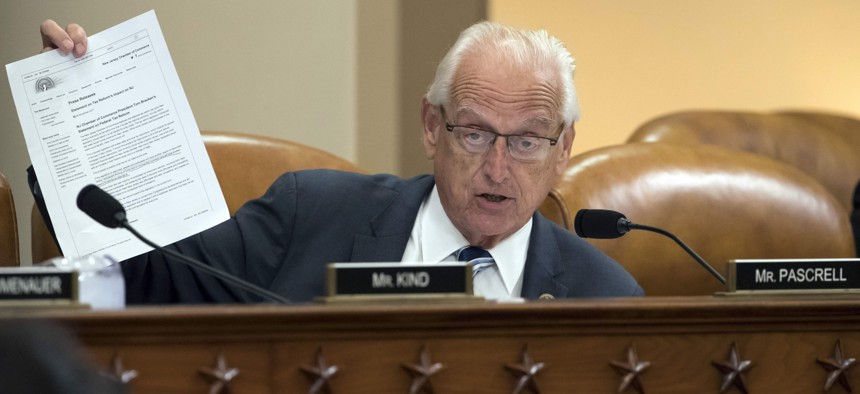Push to Restore State and Local Deduction in Tax Bill Is Defeated

Rep. Bill Pascrell, D-N.J., object to the Republican tax plan as he holds up a letter from the New Jersey Chamber of Commerce during the markup, on Capitol Hill in Washington, Monday, Nov. 6, 2017. AP Photo/J. Scott Applewhite
House Ways and Means Democrats and Republicans sparred Tuesday over the so-called SALT deduction.
WASHINGTON — Republican lawmakers rejected a Democratic-backed amendment Tuesday that would have fully restored the federal deduction for state and local taxes in the House GOP tax bill.
Rep. Bill Pascrell, a New Jersey Democrat, introduced the measure as the House Ways and Means Committee continued its markup of the bill. “An erosion of SALT is a tax increase, plain and simple,” Pascrell said, using shorthand to refer to the state and local tax deduction.
The amendment failed 23 to 16.
Republicans argue that their tax legislation will make changes to the tax code, such as roughly doubling the standard deduction, so that only the highest-income earners would claim itemized deductions, like those for state and local taxes, on their federal tax returns.
“Ninety-five percent of the people under the new tax plan will not have to itemize,” said Rep. Jim Renacci, an Ohio Republican.
In an attempt to provide tax rate cuts to corporations and individuals, without increasing federal deficits beyond $1.5 trillion over a decade, the bill eliminates a number of existing tax breaks.
“In my opinion, we’ve done a masterful job here of focusing on ways that we can raise revenue, like doing away with the state and local tax deduction, and applying that revenue to things that will invigorate our economy,” said Rep. Tom Rice, a South Carolina Republican.
“We can argue about every single deduction that we’re taking out,” Rice added. “State and local is just one of them.”
Current law allows taxpayers to write off state and local real estate property taxes, as well as either state and local income or sales taxes. The House GOP tax legislation would cap the property tax deduction at $10,000 and eliminate the income and sales tax deduction.
While this change would have implications for taxpayers in many states, it promises to have disproportionately significant effects in high-tax states like New York and New Jersey.
“New York pays $41 billion more to Washington than it receives in funding,” noted Rep. Brian Higgins, a Democrat who represents a district in the Buffalo, New York area.
“We know the game, you need to take this money from the local folks to fund your massive giveaway to American corporations,” he added.
Higgins’ Republican New York colleague, Rep. Tom Reed, who represents a nearby area that includes Ithaca and Elmira, voiced support for the compromise language in the bill that would still allow for property tax deductions, albeit with the cap.
Reed stressed that he has senior citizens and others in his district who must pay their property tax bill regardless of the income they make.
“Income taxes are very progressive,” he said. “The more money you make, the more income taxes you pay.”
“Folks on the upper end of the income spectrum, really are the ones that are going to get hit here," Reed added, as he discussed the GOP tax bill. "I would concede that.”
Bill Lucia is a Senior Reporter for Government Executive’s Route Fifty and is based in Washington, D.C.
NEXT STORY: Changes to Bond Rules in GOP Tax Bill Could Shake Up Infrastructure Financing






